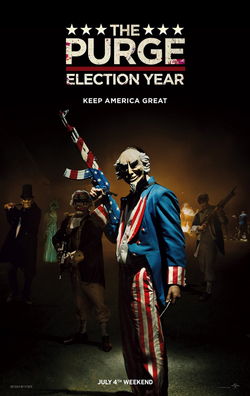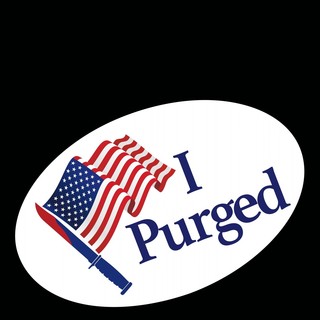 Garrison, New Jersey is a middle class suburb that is known as Cop Land. Under the direction of Lt. Ray Donlan (Harvey Keitel), several NYPD cops have made their home in Garrison, financing their homes with bribes that they received from mob boss Tony Torillo (Tony Sirico). The corrupt cops of Garrison, New Jersey live, work, and play together, secure in the knowledge that they can do whatever they want because Donlan has handpicked the sheriff.
Garrison, New Jersey is a middle class suburb that is known as Cop Land. Under the direction of Lt. Ray Donlan (Harvey Keitel), several NYPD cops have made their home in Garrison, financing their homes with bribes that they received from mob boss Tony Torillo (Tony Sirico). The corrupt cops of Garrison, New Jersey live, work, and play together, secure in the knowledge that they can do whatever they want because Donlan has handpicked the sheriff.
Sheriff Freddy Heflin (Sylvester Stallone) always dreamed of being a New York cop but, as the result of diving into icy waters to save a drowning girl, Freddy is now deaf in one ear. Even though he knows that they are all corrupt, Freddy still idolizes cops like Donlan, especially when Donlan dangles the possibility of pulling a few strings and getting Freddy an NYPD job in front of him. The overweight and quiet Freddy spends most of his time at the local bar, where he’s the subject of constant ribbing from the “real” cops. Among the cops, Freddy’s only real friend appears to be disgraced narcotics detective, Gary Figgis (Ray Liotta).
After Donlan’s nephew, Murray Babitch (Michael Rapaport), kills two African-American teenagers and then fakes his own death to escape prosecution, Internal Affairs Lt. Moe Tilden (Robert De Niro) approaches Freddy and asks for his help in investigating the corrupt cops of Garrison. At first, Freddy refuses but he is soon forced to reconsider.
After he became a star, the idea that Sylvester Stallone was a bad actor because so universally accepted that people forgot that, before he played Rocky and Rambo, Stallone was a busy and respectable character actor. Though his range may have been limited and Stallone went through a period where he seemed to always pick the worst scripts available, Stallone was never as terrible as the critics often claimed. In the 90s, when it became clear that both the Rocky and the Rambo films had temporarily run their course, Stallone attempted to reinvent his image. Demolition Man showed that Stallone could laugh at himself and Cop Land was meant to show that Stallone could act.
For the most part, Stallone succeeded. Though there are a few scenes where the movie does seem to be trying too hard to remind us that Freddy is not a typical action hero, this is still one of Sylvester Stallone’s best performances. Stallone plays Freddy as a tired and beaten-down man who knows that he’s getting one final chance to prove himself. It helps that Stallone’s surrounded by some of the best tough guy actors of the 90s. Freddy’s awkwardness around the “real” cops is mirrored by how strange it initially is to see Stallone acting opposite actors like Harvey Keitel, Robert De Niro, and Ray Liotta. Cop Land becomes not only about Freddy proving himself as a cop but Stallone proving himself as an actor.
The film itself is sometimes overstuffed. Along with the corruption investigation and the search for Murray Babitch, there’s also a subplot about Freddy’s unrequited love for Liz Randone (Annabella Sciorra) and her husband’s (Peter Berg) affair with Donlan’s wife (Cathy Moriarty). There’s enough plot here for a Scorsese epic and it’s more than Cop Land‘s 108-minute run time can handle. Cop Land is at its best when it concentrates on Freddy and his attempt to prove to himself that he’s something more than everyone else believes. The most effective scenes are the ones where Freddy quietly drinks at the local tavern, listening to Gary shoot his mouth off and stoically dealing with the taunts of the people that he’s supposed to police. By the time that Freddy finally stands up for himself, both you and he have had enough of everyone talking down to him. The film’s climax, in which a deafened Freddy battles the corrupt cops of Garrison, is an action classic.
Though the story centers on Stallone, Cop Land has got a huge ensemble cast. While it’s hard to buy Janeane Garofalo as a rookie deputy, Ray Liotta and Robert Patrick almost steal the film as two very different cops. Interestingly, many members of the cast would go on to appear on The Sopranos. Along with Sirico, Sciorra, Patrick, and Garofalo, keep an eye out for Frank Vincent, Arthur Nascarella, Frank Pelligrino, John Ventimiglia, Garry Pastore, and Edie Falco in small roles.
Cop Land was considered to be a box office disappointment when it was released and Stallone has said that the film’s failure convinced people that he was just an over-the-hill action star and that, for eight years after it was released, he couldn’t get anyone to take his phone calls. At the time, Cop Land‘s mixed critical and box office reception was due to the high expectations for both the film and Stallone’s performance. In hindsight, it’s clear that Cop Land was a flawed but worthy film and that Stallone’s performance remains one of his best.



